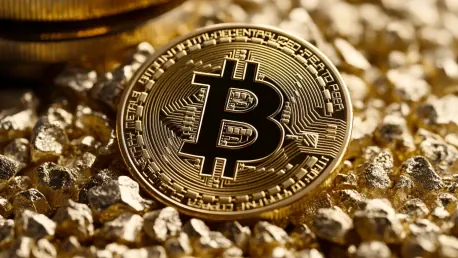The financial landscape is witnessing a potential paradigm shift, with the G8 nations contemplating the reallocation of a portion of their gold reserves to Bitcoin. This move, once considered highly speculative, is now gaining traction as Bitcoin increasingly attains recognition as “digital gold.” The evolving perception of Bitcoin prompts analysts to explore the potential benefits and implications of integrating the cryptocurrency into national reserves.
The Potential Impact of Bitcoin Reallocation
Significant Financial Implications
Matthew Sigel from VanEck has emphasized the considerable potential that lies in reallocating part of the G8 nations’ gold reserves to Bitcoin. Currently, these countries—including the United States, Germany, Italy, France, Russia, China, Switzerland, and Japan—collectively hold over 30,000 tons of gold, valued at approximately $2.9 trillion. Sigel’s analysis suggests that diverting just 5% of this gold to Bitcoin could result in an infusion of $145 billion into the cryptocurrency market. This could allow these nations to hold roughly 1.48 million BTC, accounting for more than 5% of Bitcoin’s total supply. Such a massive investment would likely drive Bitcoin’s price to unprecedented levels, securing the G8 countries’ leading positions in the global Bitcoin market.
A reallocation of this size would not only boost Bitcoin’s market demand but also solidify its classification as a valuable digital asset. The potential price surge would attract increased institutional interest and possibly prompt other countries to consider similar moves. The high liquidity and decentralized nature of Bitcoin further add to its allure, offering a modern alternative to traditional reserve assets such as gold. As more institutional investors enter the market, Bitcoin’s role as a legitimate store of value is likely to strengthen, positioning it as a key player in the future of global finance.
Complex Practicalities
Despite the evident potential, the practicality of reallocating national gold reserves to Bitcoin is fraught with complexities. Among the G8, only the United States, Russia, Switzerland, and Japan have shown a favorable disposition toward Bitcoin, making them the most likely candidates to spearhead such a transition. The United States, for instance, is considering establishing a national Bitcoin reserve, a move that could influence other nations to follow suit. Similarly, Russia and Switzerland have explored the idea of incorporating Bitcoin into their financial systems, while Japan has exhibited a growing interest in digital currencies.
However, the scenario is different for other G8 members. China has outright banned cryptocurrency trading, categorically excluding itself from this potential reallocation. France and Italy, on the other hand, have shown cautious stances regarding Bitcoin’s integration into national reserves. These diverging perspectives underscore the political and economic challenges that could impede the widespread adoption of Bitcoin as a reserve asset. The varying regulatory environments and levels of acceptance among G8 nations highlight the complexities involved in achieving such a significant shift in reserve asset management.
Rising Legitimacy of Bitcoin
Increasing Institutional Interest
Despite the hurdles, Bitcoin’s rising legitimacy contributes to its appeal as an alternative to gold. The growing institutional interest in Bitcoin is evident in the increasing number of financial institutions and companies adding Bitcoin to their balance sheets. Governments globally are adapting to digital finance, recognizing the need to keep pace with technological advancements. Reallocating even a small portion of gold reserves to Bitcoin could become a feasible strategy for diversifying national reserves and mitigating risks associated with traditional assets.
The influx of institutional investments has bolstered Bitcoin’s credibility as a stable store of value, often viewed as a hedge against inflation and economic instability. As more institutions adopt Bitcoin, its market stability and acceptance as a mainstream asset improve, potentially paving the way for broader national adoption. The integration of Bitcoin into the portfolios of prominent financial institutions and multinational corporations solidifies its role as an influential player in the digital finance landscape, driving further interest and adoption on a global scale.
Future Economic Shifts
The financial world is experiencing a potential shift, with the G8 nations considering reallocating part of their gold reserves to Bitcoin. Initially thought to be speculative, this move is gaining more support as Bitcoin is increasingly recognized as “digital gold.” Analysts are now investigating the potential benefits and implications of adding Bitcoin to national reserves. This evolving view on Bitcoin stems from its growing acceptance and value stability compared to traditional financial assets. Integrating Bitcoin into national reserves could offer diversification benefits, protect against inflation, and enhance financial sovereignty. Additionally, analysts are looking into how this transformation might impact global economics, trade relations, and even digital currency regulations. As these nations consider this significant shift, it raises questions about the role of cryptocurrencies in future economic policies and the potential risks and rewards of such investments. This developing trend suggests that Bitcoin’s role in global finance could become more prominent in the coming years.









